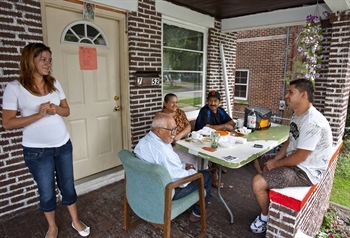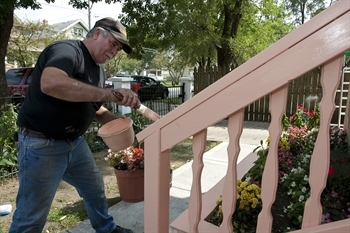
Photos by Olga Lopez
 By Sylvia Puente, Executive Director, Latino Policy Forum
By Sylvia Puente, Executive Director, Latino Policy Forum - June 22, 2011
“Prices are low! Mortgages are cheap!”
The headline from a recent report from CNN Money enticed would-be homeowners. However, as the headline concluded, reality set in:
“But you can’t get one.”
While times are tough for homeowners from all walks of life, editors could have qualified the “you:” The article reports that approximately 25 percent of all loan applications are turned down nationally; however, that number jumps to nearly 30 percent for Latinos in metro Chicago applying for conventional loans, according to Latino Policy Forum analysis of Home Mortgage Disclosure Act (HMDA) data. Further analysis of HMDA data puts the loan-rejection rate at 15 percent for metro Chicago overall, which indicates local Latinos are faring worse than their neighbors.

This month—June is National Homeownership Month—such disparities rub salt in the already-deep wounds created by the ongoing mortgage foreclosure crisis. Housing has long provided a pathway to the American Dream for Latinos, with non-Whites five times more likely to hold their homes as an asset over corporate stock. But many Latino homeowners are now fighting to keep their homes: There were more than 10,000 foreclosure filings in predominately Latino communities in Chicago and its suburbs in 2010, a sad statistic considering that Latinos accounted for half of the overall growth in owner-occupied homes in the region over the last decade.
Of these 10,000 foreclosures, the lion’s share is in the suburbs: Aurora, Cicero, Berwyn, Elgin and Waukegan together saw more than 6,000 filings last year. In efforts to assist multicultural homeowners in suburban communities, staff from a variety of local housing organizations, including the Latino Policy Forum, Metropolitan Planning Council, The Resurrection Project, and the Oak Park Regional Housing Center, teamed up for a Home Rescue Fair in Melrose Park at the beginning of the month. Approximately 200 Latino families, from young parents pushing strollers to seniors forced to choose between paying medical bills and their mortgage, came in search of options—and hope—for saving their homes.

Unfortunately, many learned that options to keep their home were limited—or non-existent. These families are not alone: The value of new loans in Latino communities has dropped an estimated 63 percent nationally. Homeowners fighting to save their homes through refinancing also face disparities: One-in-three Latino refinance applications are denied in Metro Chicago, compared with just 17 percent of applications from non-Latinos, according to Latino Policy Forum analysis of HMDA data.
Ironically, before the housing bubble burst, lenders were tripping over themselves to issue loans—albeit many sub-prime and predatory—in minority communities. The repercussions of those faulty loans are now as apparent (and ugly) as the plywood-covered windows of the corresponding homes in foreclosure.
Until Latinos have access to affordable mortgage options and appropriate housing counseling services, foreclosures will continue to ravage neighborhoods across the state. The Latino Policy Forum calls for transparency and accountability from financial institutions, with firm, immediate legal action against the fraudulent mortgage practices—sub-prime and predatory loans, discriminatory lending, and mortgage rescue scams—that too often target Latino communities. The Woodstock Institute offers additional action steps for regulatory and enforcement agencies that will benefit all homeowners. And RHOPI, the Regional Home Ownership Preservation Initiative, calls for increased access to housing counseling resources in South and West Cook County—communities of color—as an important step in fighting growing foreclosure rates across the region.
Illinois had the country’s ninth-highest foreclosure rate last year. The dismal ranking is not surprising, given that one of the state’s largest segments of homeowners is also one of the hardest-hit by foreclosure. Latino or otherwise, it benefits us all to support and enforce policy that allows our neighbors to have access to quality, affordable housing—and the decent, affordable mortgages needed to pay for them.
For more information about the work we’re doing to help Latino families access quality, affordable housing, contact Housing Policy Analyst Juliana Gonzalez-Crussi. Take action at the federal level by sending an e-card to U.S. Treasury Secretary Timothy Geithner.
Sylvia Puente is executive director of the Latino Policy Forum and a member of MPC's Housing & Community Development Committee.